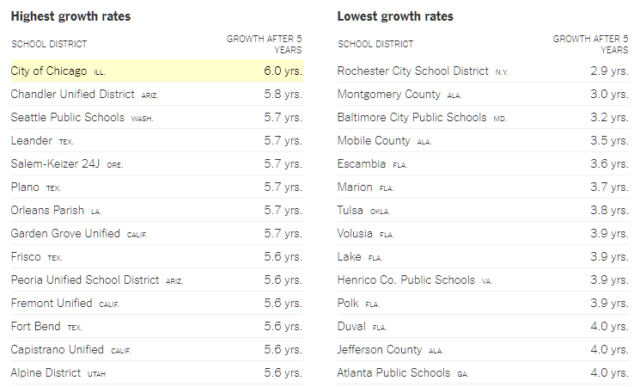Thanks to the Kaiser Foundation and other nonprofits, Tulsa has taken the lead in early education and many other social service efforts. Their humane and science-based efforts probably explain why Tulsa Public Schools third-graders score higher than their counterparts in Oklahoma City (and Chicago).
Over the next five years, however, Tulsa students’ progress from third to eighth grade is the nation’s seventh slowest, according to data from Stanford’s Center for Education Policy Analysis that focuses on the 200 largest school districts in America. Tulsa student growth advances only 3.8 years over the next five. By contrast, OKCPS students progress 4.4 years from third to eighth grade. Chicago student performance increases by six years during those years.
Tulsa’s absenteeism rate doubles national average
Clearly, the problems with educational growth rates are linked to Tulsa’s chronic absenteeism rate. The district has 10,000 chronically absent students. Its chronic absenteeism rate is 25.7 percent, nearly double the national rate.
Also, Tulsa made a big mistake in participating in the Gates Foundation’s failed, test-driven “teacher quality” and “personalized learning” experiments. Mixed messages can be deadly in terms of school improvement, and who knows what to think about Superintendent Deborah Gist, who made her reputation as a brass-knuckled corporate reformer but who now says nice things about teachers?
Last, I suspect that Tulsa is more segregated, and that contributes to part of the problem.
Hope rests with Oklahoma’s new ESSA
Fortunately, Oklahoma’s new Every Student Succeeds Act (ESSA) stresses improvements in chronic absenteeism, creating the opportunity for Tulsa (and the OKCPS) to focus on metrics that really matter as opposed to invalid and unreliable test score-growth models.
The ESSA also calls for “evidence-based programs,” and there is no better research than that of the Chicago Consortium for School Reform (CCSR). Oklahoma should learn from the partnership between the Chicago schools and the CCSR and heed the experts’ advice about collaborating with parents, high-quality pre-k, absenteeism, principal autonomy, use of data for diagnostic purposes, mentoring freshmen to keep them on track for graduation, and other socio-emotional supports.























